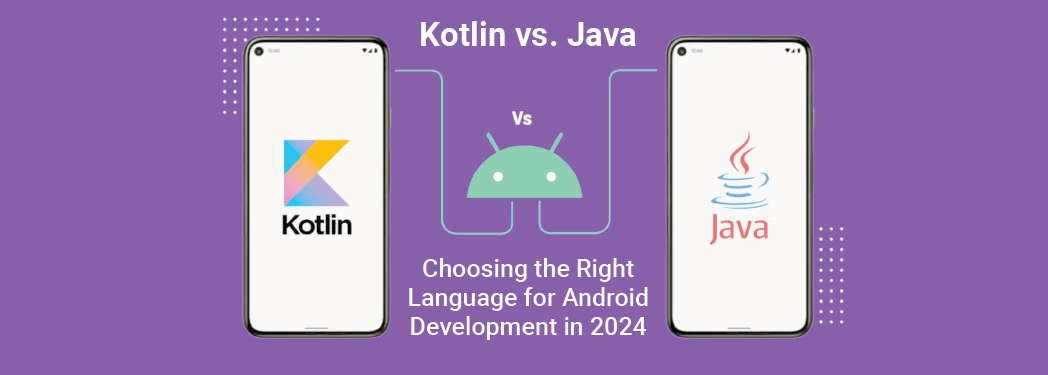Kotlin vs. Java: Choosing the Right Language for Android Development in 2024

In the realm of Android development, the choice between Kotlin vs. Java has been a pivotal decision for developers and organizations alike. As we step into 2024, this choice has become more relevant with each language offering unique benefits, features, and an ecosystem designed to enhance Android app development. This blog aims to compare Kotlin and Java, highlighting the advantages and potential use cases of each to guide developers in choosing the best fit for their projects.
Java: The Veteran of Android Development
Java has been the backbone of Android development since the platform’s inception. Its widespread usage, robustness, and extensive community support have made it a reliable choice for developers around the world.
Advantages of Java:
1. Mature Ecosystem: Java’s long-standing presence has led to a mature ecosystem with extensive libraries, frameworks, and tools for Android development.
2. Wide Community Support: A large and active community means vast resources, forums, and documentation, which can be invaluable for solving development challenges.
3. Cross-Platform Compatibility: Java’s “write once, run anywhere” (WORA) philosophy makes it an attractive option for applications that need to run across multiple platforms, not just Android.
Use Cases for Java:
1. Enterprise-Level Applications: Java’s robustness and scalability make it suited for complex enterprise applications requiring a stable and proven foundation.
2. Cross-Platform Applications: Projects that aim for a broader platform reach can benefit from Java’s cross-platform capabilities.
Kotlin: The Modern Contender
Kotlin, officially supported by Google for Android development since 2017, has quickly risen to prominence. Designed to be fully interoperable with Java, it offers a more concise syntax, modern features, and functional programming capabilities.
Advantages of Kotlin:
1. Concise Code: Kotlin significantly reduces boilerplate code, making programs more concise, readable, and easier to maintain.
2. Modern Language Features: Features like extension functions, null safety, and coroutines for asynchronous programming make Kotlin a modern language that addresses common development pain points.
3. Interoperability with Java: Kotlin is interoperable with Java, allowing developers to use both languages within the same project seamlessly.
4. Safety Features: Kotlin’s null safety and immutability features help in building more reliable and bug-free code.
Use Cases for Kotlin:
1. New Android Projects: Kotlin’s modern syntax and features, along with Google’s backing, make it the preferred choice for new Android applications.
2. Applications Requiring Modern Language Features: Projects that can benefit from Kotlin’s modern features, like coroutines for simplified async programming and better handling of nullability, should consider Kotlin as their primary language.
Choosing the Right Language for Your Project
The choice between Kotlin and Java ultimately depends on several factors:
1. Project Requirements: The specific needs of your project may lean towards the strengths of one language. For instance, Kotlin is often preferred for its concise syntax and modern features, while Java may be favored for its robustness and cross-platform capabilities.
2. Team Expertise: The existing experience and familiarity of your development team with either language can significantly influence the decision. Transitioning to Kotlin may require additional training for a team deeply rooted in Java.
3. Legacy Code and Libraries: For projects with a significant existing codebase in Java, or those heavily reliant on Java libraries, gradual integration with Kotlin might be the practical approach.
Conclusion
Both Kotlin and Java have their unique strengths and use cases in the Android development landscape of 2024. Kotlin’s rise in popularity, backed by Google, presents compelling features and efficiencies, particularly for new projects. Java, with its vast ecosystem and cross-platform capabilities, remains a powerful option, especially for applications with a broader scope beyond Android. Developers should weigh their project requirements, team expertise, and future goals to make the best choice between these two influential languages in the evolving world of Android development.
In the realm of Android development, the choice between Kotlin vs. Java has been a pivotal decision for developers and organizations alike. As we step into 2024, this choice has become more relevant with each language offering unique benefits, features, and an ecosystem designed to enhance Android app development. This blog aims to compare Kotlin and Java, highlighting the advantages and potential use cases of each to guide developers in choosing the best fit for their projects.
Java: The Veteran of Android Development
Java has been the backbone of Android development since the platform’s inception. Its widespread usage, robustness, and extensive community support have made it a reliable choice for developers around the world.
Advantages of Java:
1. Mature Ecosystem: Java’s long-standing presence has led to a mature ecosystem with extensive libraries, frameworks, and tools for Android development.
2. Wide Community Support: A large and active community means vast resources, forums, and documentation, which can be invaluable for solving development challenges.
3. Cross-Platform Compatibility: Java’s “write once, run anywhere” (WORA) philosophy makes it an attractive option for applications that need to run across multiple platforms, not just Android.
Use Cases for Java:
1. Enterprise-Level Applications: Java’s robustness and scalability make it suited for complex enterprise applications requiring a stable and proven foundation.
2. Cross-Platform Applications: Projects that aim for a broader platform reach can benefit from Java’s cross-platform capabilities.
Kotlin: The Modern Contender
Kotlin, officially supported by Google for Android development since 2017, has quickly risen to prominence. Designed to be fully interoperable with Java, it offers a more concise syntax, modern features, and functional programming capabilities.
Advantages of Kotlin:
1. Concise Code: Kotlin significantly reduces boilerplate code, making programs more concise, readable, and easier to maintain.
2. Modern Language Features: Features like extension functions, null safety, and coroutines for asynchronous programming make Kotlin a modern language that addresses common development pain points.
3. Interoperability with Java: Kotlin is interoperable with Java, allowing developers to use both languages within the same project seamlessly.
4. Safety Features: Kotlin’s null safety and immutability features help in building more reliable and bug-free code.
Use Cases for Kotlin:
1. New Android Projects: Kotlin’s modern syntax and features, along with Google’s backing, make it the preferred choice for new Android applications.
2. Applications Requiring Modern Language Features: Projects that can benefit from Kotlin’s modern features, like coroutines for simplified async programming and better handling of nullability, should consider Kotlin as their primary language.
Choosing the Right Language for Your Project
The choice between Kotlin and Java ultimately depends on several factors:
1. Project Requirements: The specific needs of your project may lean towards the strengths of one language. For instance, Kotlin is often preferred for its concise syntax and modern features, while Java may be favored for its robustness and cross-platform capabilities.
2. Team Expertise: The existing experience and familiarity of your development team with either language can significantly influence the decision. Transitioning to Kotlin may require additional training for a team deeply rooted in Java.
3. Legacy Code and Libraries: For projects with a significant existing codebase in Java, or those heavily reliant on Java libraries, gradual integration with Kotlin might be the practical approach.
Conclusion
Both Kotlin and Java have their unique strengths and use cases in the Android development landscape of 2024. Kotlin’s rise in popularity, backed by Google, presents compelling features and efficiencies, particularly for new projects. Java, with its vast ecosystem and cross-platform capabilities, remains a powerful option, especially for applications with a broader scope beyond Android. Developers should weigh their project requirements, team expertise, and future goals to make the best choice between these two influential languages in the evolving world of Android development.




























